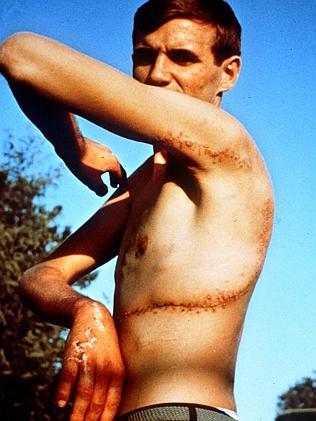On the 50th anniversary of shark attack, Rodney Fox says fixed-wing planes better option for shark spotting
A SPATE of shark sightings has led to renewed calls for shark patrol funding to be shifted from a fixed-wing plane to Surf Life Saving SA's helicopter.
A SPATE of shark sightings has led to renewed calls for shark patrol funding to be shifted from a fixed-wing plane to Surf Life Saving SA's helicopter.
Lifesavers say the helicopter is more effective and can herd sharks out to sea but the State Government insists money is better spent on fixed-wing flyovers, which are cheaper to run.
On the 50th anniversary of his near-fatal shark attack, shark expert Rodney Fox, 73, said patrols by both aircraft gave beachgoers more confidence in the water but he believed the cheaper fixed-wing plane was a better option because it could patrol for longer.
Surf lifesavers have already spotted 28 sharks since patrols started in mid-October, including 10 in one day.
More: Government cuts funding for helicopter shark patrols
A shark was seen at Carrickalinga on Sunday and there were six sightings on Saturday around Moana and Normanville.

Last summer, the Government shifted $140,000 from funding the Westpac helicopter used for patrols by Surf Life Saving SA to the fixed-wing plane run by UniSA, saying that it meant beaches could be patrolled for an extra 170 hours.
Opposition Leader Steven Marshall has promised to reinstate the $140,000 to Surf Life Saving SA.
After a ride in the Westpac helicopter with SLSSA President John Baker, Mr Marshall said money could be saved from the Government advertising budget to cover the cost.
"Lifesavers are saying this is absolutely critical for them (so) we're going to back them," he said.
More: Fishermen risk lives and limbs to free trapped tiger shark

Mr Baker said this season's sightings, which have involved mostly bronze whaler sharks, were higher than at the same time last year.
"We believe there are larger schools of fish coming in closer to the shore and this is why we've sighted more sharks," he said. "To have six in one day is a lot, but we did have 10 in one day earlier in the year."
On December 8, 1963, Mr Fox was attacked by a great white shark off Aldinga Beach while spearfishing.
Returning to the scene of the attack, Mr Fox said while patrols by either a helicopter or plane gave swimmers more confidence it made sense to fund the aircraft that could be in the air the longest.
"The longer there's an eye in the sky ... it will give people more confidence for longer," he said. "It always comes back to the expense."
Mr Fox said he would like to see more money spent on research into shark-repelling technologies. which would help people to feel safe in the water.
He said anyone who found themselves in the water with a shark should keep their eyes on the animal and move slowly towards other people or the shore.
He recommended swimmers stay between the lifesaver flags and stay out of the water or in the shallows if a shark was spotted.
"If a shark is herded out by the helicopter, there's no reason to say they won't come back in 10 minutes later," Mr Fox said.
